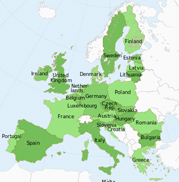 The announcement came after health ministers from 28 European Union countries met in Brussels where they agreed new European Council ‘Conclusions’ on vaccination. The meeting was chaired by the Italian government which held the rotating six-month EU Presidency in the second half of 2014.
The announcement came after health ministers from 28 European Union countries met in Brussels where they agreed new European Council ‘Conclusions’ on vaccination. The meeting was chaired by the Italian government which held the rotating six-month EU Presidency in the second half of 2014.
Ministers called on national governments to “consider immunisation beyond infancy and early childhood by creating vaccination programmes with life-long approach”. They also agreed to encourage research aimed at “demonstrating the benefits of a life-course approach”.
In addition, the Conclusions said national policies in this area should take account of input from the European Centre for Disease Prevention and Control (ECDC) and the World Health Organistation (WHO).
“Vaccination remains an effective tool to prevent communicable diseases and EU-level cooperation brings added value,” health ministers agreed.
Time for action
This is not the first time EU health ministers have come together to call for action on vaccine-preventable diseases. In June 2011, they pledged to tackle outbreaks of ‘childhood illnesses’ such as measles and pertussis.
That move came in response to a series of outbreaks in Europe, as well as some high-profile instances of Europe ‘exporting’ measles cases to the US and Canada.
However, there has been a growing realisation among experts that vaccines are not just for kids. At a the launch of the SAATI Report in the European Parliament last year it was noted that adults and adolescents are vulnerable to several vaccine-preventable illnesses.
For older people, influenza, pneumococcal disease and shingles are just some of the diseases against which immunisation is available. On top of that, pregnant women are encouraged to have pertussis and flu vaccines, teenagers can have vaccines against cervical cancer, and people of all ages have travel vaccines.
Even measles, often thought of as a childhood illness, is a risk for adults. Several European countries now run catch-up campaigns targeting adolescents and young adults who missed out on vaccination as children.
Research has pointed to significant health and economic benefits associated with vaccinating older people given the potential for reducing hospitalisation and allowing people of all ages to remain active for longer.
Now that politicians from across Europe have backed a ‘life-long approach’ to immunisation, perhaps the full potential of vaccines for preserving health will be reached.



